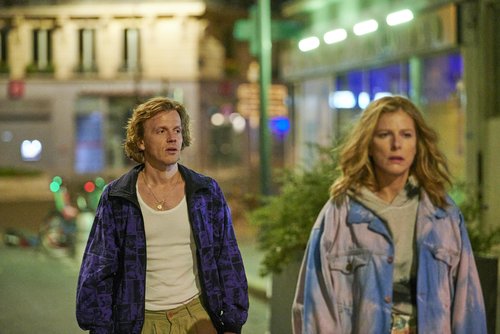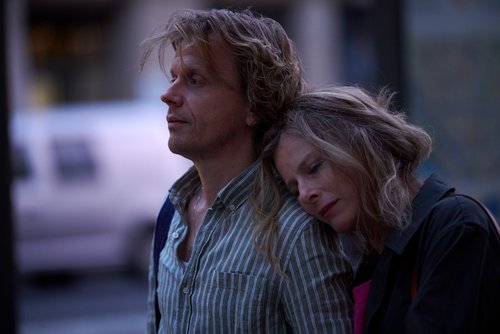Film Review: Une Nuit, Directed by Alex Lutz
- SUBSCRIBE
- ALREADY SUBSCRIBED?
BECOME A BONJOUR PARIS MEMBER
Gain full access to our collection of over 5,000 articles and bring the City of Light into your life. Just 80 USD per year.
Find out why you should become a member here.
Sign in
Fill in your credentials below.
A night to remember
Years ago Martin Scorsese made a film called After Hours, about a man who’s lost in late-night Manhattan and embarks on a series of misadventures. Alex Lutz’s Une Nuit has the same basic structure, except that the action takes place in Paris. A second major difference is that the film focuses on a man and a woman who are thrown together, and then stay together, during their bizarre night on the town due to some mysterious elective affinities.
The night starts with a dispute on a metro train, something many Parisians have experienced. Something trivial that one or both parties should let go of, but sometimes can’t, like two disputatious dogs straining at their respective leashes. Nathalie (Karine Viard) is the hot-headed middle-aged woman, while Aymeric (played by director Lutz) is arrogantly dismissive. After getting off the train they somehow veer to a physical encounter that’s more pleasant but less plausible. They should be two ships that screw in the night, but those affinities ramp up, and so we have two vectors of suspense: Will they stay together? And what’s the point, what will they learn about one another?

Une Nuit ©MC Orlando
Along the way we enjoy the performances of the principals. Karine Viard is one of the great unsung stars of French cinema, someone often considered merely a solid, dependable actress, which would be enough for most film professionals. However, Ms. Viard can express an impressive range of emotion while seeming like an earthy Everywoman. She’s unflashy, but utterly authentic, middle-aged but still attractive with her smile and honey-blond hair, and occasionally rasping voice, though she performs with minimal make-up. Even the crows-feet and smile-lines are alluring. Her character has an air of not so quiet desperation, something not working in her marriage, life in general—or maybe just a midlife crisis.

Une Nuit ©MC Orlando
Aymeric is another story. At first glance he might seem a good complement for Nathalie. He’s handsome in a Kris Kristofferson kind of way. Even his longish, honey-blond hair matches hers. He’s calmer than she is, tolerating her outbursts with a smile, and sometime breaks out with a loud laugh. Yet there’s something self-contained about him. He’s one of those people who’s built his private world out of answers instead of questions. He works in publishing though he’s vague about his precise role: proof-reader? author? He’s so smooth he’s slippery.
Since Lutz is also the director, we might suspect that he’s over-indulging his alter ego. He also wrote the script (but then Viard collaborated with him on it). Otherwise, his direction is assured, and very flexible. A short detour in a sex club is filmed with a neon-like vibe, while an episode with a runaway horse is dreamlike. A party they crash is shot like a jagged youth-cult film. These variations keep us both entertained and off balance.

Une Nuit ©MC Orlando
Lutz has wide experience in show business, as a humorist, actor, theater director, writer, TV personality. This accounts for the assurance of his technique, but it’s surprising, given that most of the experience is actor-centric (including directing and writing for others), that the film’s set-pieces lack sharp dramatic focus and development. Each of the episodes is like a mini-sketch (reflecting that comedy has been his main genre) while we feel they should be mini-dramas taking us deeper into the core of these two characters, who seem like oddballs, but also remind us of ourselves.
Like Nathalie, Aymeric has a spouse and two daughters. Their respective relationships seem to be the crux of the movie. She’s so frazzled and thin-skinned we imagine that she’s a classic put-upon wife and Mom, except that it’s too late for her to leave the dollhouse. On the other hand, Aymeric seems to have egocentrically distanced himself from his domestic life. We can’t be sure since we’re not privy to his back-story or inside his head. But we do get the feeling that paradoxically he needs Nathalie more than she needs him. She wants escape, an experience, but also has a sense of responsibility and the requirements of life.

Une Nuit ©MC Orlando
But there’s life and then there’s life. One is embodied in our phones: facile messages, workaday demands, the virtual conveyor belt of social media. In Easy Rider, Captain America signals the nature of his quest by smashing his watch. Here there’s something analogous done with the duo’s smart-phones. It represents jettisoning one kind of life, and searching for another. The irony is that their search doesn’t include any significant others (except maybe for the significant others left at home). Apart from the two leads, the film is filled more or less with extras and bit players. This lack of engagement with others makes this a fascinating film, but less than truly compelling.

Une Nuit ©MC Orlando
One exception is when the couple drops in on the amateur theater troupe Nathalie once participated in. We see her fully engaged, not frazzled or alienated. We see the potential in her (while Aymeric looks on benignly). We also see a clue to the twist that the film culminates in. No spoilers, but you’ll probably guess it in any case. In a pop film, this kind of M. Night Shyamalan-type twisteroo can be witty and entertaining. When a film is more character-driven, like Une Nuit, it can make us scratch our heads about the deeper meaning of the story (and our own stories). Is it really deep? Or is it superficial? Une Nuit leaves the viewer wondering about the difference, or similitude, between the two.
Production: Maneki Films
Distribution: Studiocanal
Lead photo credit : Une Nuit poster ©Studiocanal
More in Alex Lutz




